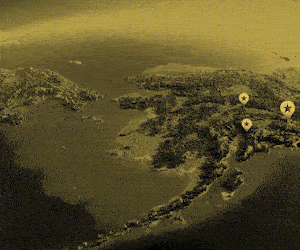Alaska, B.C. get poor scores for investment
Fraser Institute releases annual investment 'report card' for 64 mining regions; Alaska's grade drops, B.C. scores higher than last year but companies still wary of investing in British Columbia because of tough environmental regulations, Native land claims uncertainty
Last updated 3/27/2005 at Noon
For the first time since the Fraser Institute began its investment survey in 1997, British Columbia did not score in the bottom 10 of the "policy potential index," although it remained in the bottom third. Alaska, although it rated high for potential investment, dropped from 29th place last year to 55th place this year in investment attractiveness.
The Fraser Institute describes the index as a report card to governments on the attractiveness of their mining policies. A total of 259 company exploration managers from around the world responded to the survey, released in March, giving their opinions on the investment attractiveness of 64 regions. Last year 159 executives responded to the survey on 53 regions. Some company presidents and other executives chose to respond to the survey, which is sent to exploration managers.
Nevada was rated as having the best mineral policies for the fifth straight year, Zimbabwe came in last. Russia, fourth from the bottom, sunk from 40th place out of 53 in 2003-2004.
Russia's lower rating this year was probably due to doubts about the future of market reforms, the report said. British Columbia placed 44th out of 64 this year, with Yukon coming in 34th and Alaska 33rd.
Alaska has room for policy improvement
In the mineral potential index, which assesses whether a region's mineral potential under the current policy environment encourages or discourages exploration, Alaska dropped from 29th place last year to 55th place this year. No reason was given in the report. Yukon came in 52nd, British Columbia 48th and Russia 42nd, with Nevada at the top here, too.
However, in the best practices mineral index, which looks at a region's mineral potential if it had policies (taxes, regulations, etc.) that encouraged development, Alaska came in third out of 64, up from 24th place last year. Yukon came in 29th, Russia 15th and British Columbia 12th in that index. Tasmania was the top-rated region.
Russia scored poorly on a question about uncertainty concerning the administration, interpretation and enforcement of existing regulations. Only 3 percent of respondents thought this factor encouraged investment in Russia, while 19 percent considered it a strong deterrent and 30 percent would not pursue investment due to this factor. By contrast, 22 percent of respondents said this factor encourages investment in Alaska, and 41 percent said it was not a deterrent to investment in Alaska.
British Columbia fares poorly on regs
In a question about environmental regulations, Russia did much better, with 19 percent saying they encouraged investment in that country and 46 percent saying they were not a deterrent to investment.
On the other hand, "Yukon regulators forced the repair of a 300 meter-long bulldozer track leading off a highway to a drill site," the president of an exploration company said in the survey. "Repair consisted of hand-placing peat moss in the bulldozer tread marks. In spite of the fact that the track was being reclaimed naturally and that there was evidence of older bulldozer tracks (related to highway construction) that could never be considered as contributing to any environmental impact problem."
British Columbia was criticized even more strongly for its environmental regulations than Yukon and Alaska, with 31 percent of respondents saying they were a strong deterrent to investment in the province and another 8 percent saying they would not pursue investment due to this factor.
Taxation, Native claims issues in Russia, Canada
Russia's taxation regime is considered a serious problem for mining companies, with only Zimbabwe faring worse in this survey question (although California was one place above Russia). A total of 29 percent of respondents consider this factor a strong deterrent to investment in Russia, with 14 percent saying they would not pursue investment due to this factor. British Columbia, Yukon and Alaska received much more favorable responses to this question.
Uncertainty concerning Native land claims is an important issue for miners in Canada.
"Anywhere you work in Canada, Native land claims are possible at any time, and no matter how outlandish the claim, the provincial or federal government will not support a tax-paying company by applying the Mining Act. It will inevitably run and hide," the president of an exploration company said in the survey. "In Canada, British Columbia (is the worst jurisdiction) because of Native land claims," another exploration company president said.
British Columbia scored last out of the 64 regions on the question about Native land claims, with 42 percent of respondents saying this factor is a strong deterrent to investment in the province, and 14 percent saying they would not pursue investment due to this factor. Yukon and Alaska had slightly better results and Native land claims were not considered a very serious problem in Russia.
Another question where British Columbia did poorly was about uncertainty concerning which areas will be protected as wilderness or parks. British Columbia came 62nd here, ahead of Wisconsin and California. The issue was not considered quite so important in Yukon, Alaska or Russia.
On a question about infrastructure, British Columbia did extremely well, coming in 14th in the list, while Alaska and Yukon scored much lower and Russia came in at 58.
Russia scores poorly on socioeconomic agreements
On socioeconomic agreements, Russia again came near the bottom.
"Russia (has) a dysfunctional legal and regulatory system geared to favor the entrenched interests," an official from an exploration company said in the survey. "You find something of value and someone will find a way to steal or expropriate any economic benefit from you."
British Columbia was also criticized by the president of one exploration company, who said: "Giving in to special interest groups for reasons of political expediency and a history of having due process set aside or killed by government and/or the courts make British Columbia one of the worst investment climates on earth." Nevertheless, British Columbia scored well on this question, as did Yukon and Alaska.
British Columbia landed in the bottom half of the table on a question about political stability.
"British Columbia has a history of severe swings in politics and the ideologies of the political party in power. What a mess!!!" the manager of an exploration company said. Russia was much further down the table with Yukon and Alaska scoring near the top.









Reader Comments(0)